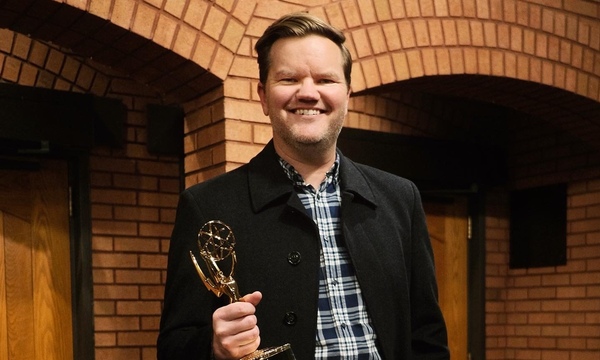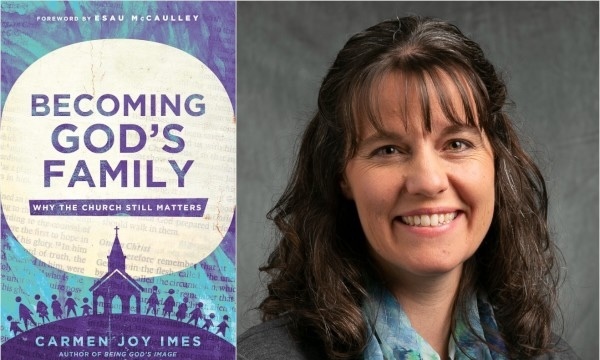On May 14, 2010, 1,400 people filled Chase Gymnasium on a Friday night to learn from Stephen Meyer and some of his critics about how Intelligent Design arguments fair in light of some of the strongest objections.
Meyers’ award-winning bestseller, Signature in the Cell, was a hot topic of debate and dialogue, though the event was not simply focused on the book.
“We wanted this to be an opportunity to help resource people with knowledge about what Intelligent Design theory claims or does not claim,” said Abigail Schilling, Biola’s events and media coordinator for the Christian apologetics program.
Meyers’ critics included Steve Matheson, theistic evolutionist and biologist from Calvin College, and Arthur Hunt, a Darwinian evolutionist and biologist from the University of Kentucky. The evening consisted of talks by Meyers and his critics, along with a stimulating Q&A among themselves and with the audience at the event and around the world via Twitter.
The event drew people from surrounding counties in Southern California, and even some from Northern California, bringing together parents, students, teachers, pastors, and parachurch leaders. While several hundred experienced the event at Biola, at least another five hundred people paid to watch the event online either live or on-demand, viewing it mostly in the company of small groups from twenty-eight states and six countries, including Kenya, the Ukraine, Hong Kong, and Australia.
The theory of Intelligent Design attempts to show how and why certain features of the universe and of living things are best explained by an intelligent cause, not an undirected process such as natural selection.
Consequently, Intelligent Design theory challenges the orthodoxy of Darwinian Evolution, and the worldview of naturalism that underwrites it in biology, cosmology, neuroscience, psychology, and other scientific fields that have been traditionally understood to be well-funded, politically mobilized, knowledge-defining arenas in Western societies.
It’s understandable that Intelligent Design theory would have critics, especially given what is at stake culturally, educationally, and scientifically, which is handsomely captured in “Darwin’s Dilemma,” a new Illustra Media DVD presentation that was previewed on Saturday morning, May 15, 2010 in Mayers Auditorium at Biola.
Moreover, Biola established the Phillip E. Johnson Award for Liberty and Truth in 2004 in order to honor legal scholar and retired Berkeley law professor Phillip E. Johnson, who was the award’s first recipient. The award recognizes Johnson’s pivotal role in advancing our understanding of design in the universe by opening up informed dissent to Darwinian and naturalist theories of evolution.
On Saturday afternoon, bioethicist Richard Land became the latest recipient of the Johnson Award at an exclusive “Future of Intelligent Design” luncheon at Biola. Land is president of the Ethics & Religious Liberty Committee of the Southern Baptist Convention and serves on the U.S. Commission on International Religious Freedom.
Land received the award from Biola’s President Barry H. Corey in recognition of his advocacy for human dignity, the rights of the unborn and infirm, pro-family policies, and other conservative evangelical bioethical concerns.
Since 1993, Biola has hosted over twenty-five events on Intelligent Design, ranging from public, international conferences to private faculty workshops, many of which have been sponsored by Biola’s Graduate Programs in Christian Apologetics (MACA) and Science and Religion (MASR).
It’s not accidental that Biola has become a leading institutional hub for the work of the Intelligent Design movement, especially given that some of the movement’s influential proponents reside at Biola, including Research Professor of Philosophy, Dr. William Lane Craig, Distinguished Professor of Philosophy, Dr. J.P. Moreland, Torrey Honors Institute Founder and Director, Dr. John Mark Reynolds, and MASR founder and professor of physics, Dr. John Bloom.
Moreover, Biola’s deep commitment to Christian apologetics, biblical worldview integration, and the recognition that Christianity is a knowledge tradition (as opposed to a mere “faith tradition”) has helped shape an institutional ethos intent on helping to lead at the intersection of such areas as science and theology.
 Biola University
Biola University
.jpg)

